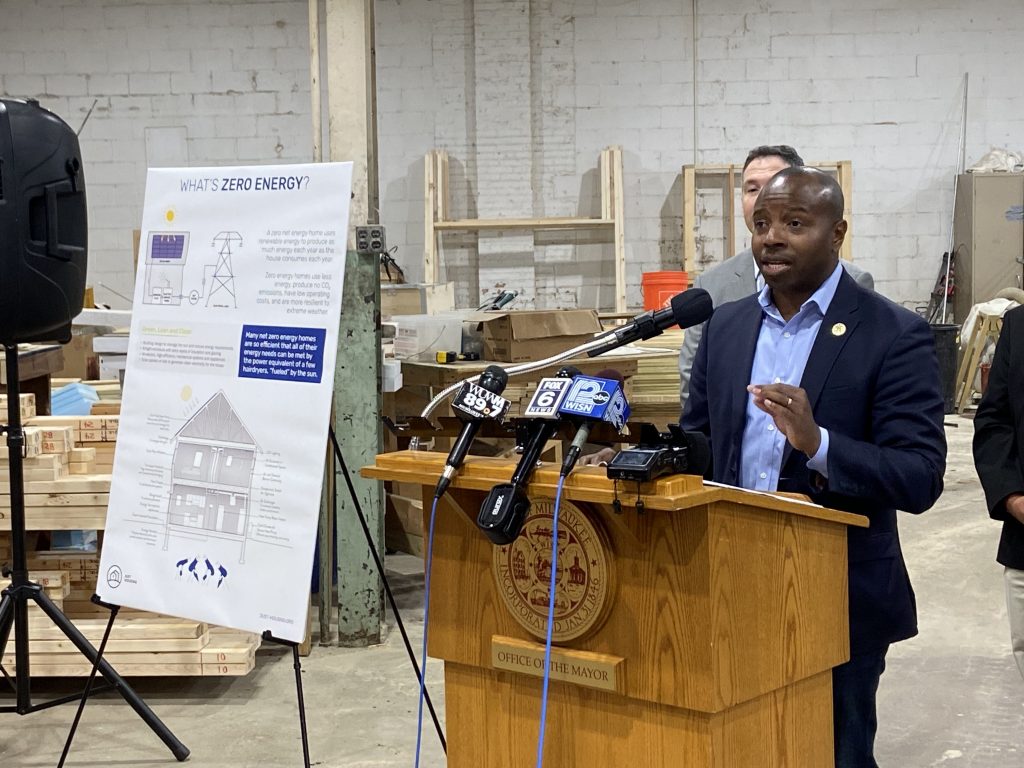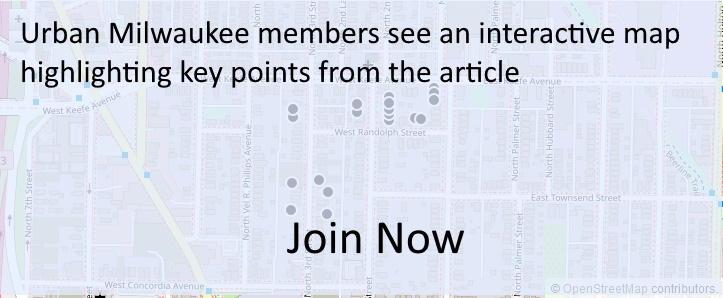Federal Grant Boosting Energy Efficient Affordable Housing Program
$3.4 million grant supports program building new affordable homes with net-zero greenhouse gas emissions.

Mayor Cavalier Johnson announces federal grant for net-zero housing at Habitat for Humanity headquarters. Photo taken Sept. 6, 2024 by Graham Kilmer.
The City of Milwaukee’s energy efficient affordable housing program is getting a boost from the U.S. Department of Energy (DOE).
Mayor Cavalier Johnson announced Friday the city was awarded a $3.4 million grant from the federal agency, which will be used to develop factory-built, highly-energy efficient affordable homes on city-owned vacant properties. The city will make the funding available as gap financing for developers partnering with the city to build the homes.
The construction method, which relies on building most of the components off-site, reduces costs and increases the speed of development, said Erick Shambarger, director of environmental sustainability for the City of Milwaukee.
“This is a major opportunity for us to reduce the cost of new home construction, increase home ownership and support green manufacturing jobs, especially for people of color,” Shambarger said.
The homes are being developed as part of the city’s All-Electric, Affordable Net-Zero Energy Homes Program, which is one of 10 major projects in the city’s climate plan. The program was developed the city’s Environmental Collaboration Office (ECO) in partnership with the nonprofit Community Development Alliance (CDA).
City officials announced the federal grant award at Habitat for Humanity’s headquarters, 3726 N. Booth St., where housing components, like wall frames, are being manufactured for the city’s first factory-built, net-zero homes. Shambarger and Johnson were joined by representatives of project projects CDA, Habitat for Humanity and the UW-Milwaukee School of Architecture and Urban Planning.
The homes will be built with all-electric energy systems and appliances, and highly efficient heating, ventilation and air conditioning (HVAC) systems. The homes are called Zero Energy Ready Homes, which is a term used by DOE to describe homes that are so energy efficient a single renewable energy system — like a heat pump or solar — could offset most or all of the home’s annual energy use.
“This type of construction reduces long-term operating costs of the home, lowering the energy costs for the residents in the home,” said Johnson.
The plan envisions starter homes between 1,200 and 2,400 square feet. Gap financing up to $40,000 is available to developers to ensure the homes are affordable for homebuyers, and approximately $1 million in American Rescue Plan Act (ARPA) funding, allocated in 2021, is available as seed money for a private manufacturing facility that can begin turning out the factory-built home components.
“I would love to have it in 30th Street Industrial Corridor, so that we’re creating manufacturing jobs for the long term, as well as a construction jobs,” Shambarger said.
Ald. Robert Bauman has authored a resolution to take the remaining $900,000 out of the net-zero housing project and provide it to Near West Side Partners for development of Concordia 27, a mixed-use affordable housing project on N. 27th Street in Bauman’s district. Bauman’s resolution notes that the city has until the end of the year to obligate ARPA funds or return them to the federal government, and that the housing program has only encumbered $894,810 of the $1 million allocated.
Shambarger told Urban Milwaukee the funding is already under contract.
The council allocated it for the purpose of building the Zero Energy homes he said. “They allocated $1 million out of many, many, many, many, many, many more millions to preserve existing homes. So our plan is to move forward with this, and we just showed with this grant that that was money well spent to leverage a bigger investment.”
The city is trying to stimulate a new market of low-cost, highly-efficient starter homes in Milwaukee. It is also making technical assistance available to Milwaukee developers, builders and architects interested in building homes with the new technologies, and partnering with the UW-Milwaukee School of Architecture and Urban Planning to prototype and test new construction systems and market-ready housing components.
“We have to increase the productivity of how we build houses, so we can build more houses faster, and if we do that, that’ll increase the supply and bring the housing costs down,” Shambarger said.
The project hits on the twin goals of the city’s climate plan to reduce greenhouse gas emissions and improve racial equity through green jobs. The city is also trying to increase affordable housing in some of its poorest neighborhoods, targeting vacant lots on the near-north and south sides for development.
“We’ve demolished old, unsafe homes over the years, and now have thousands of vacant lots in residential neighborhoods where homes once stood in the past,” Johnson said. “And not just where homes once stood the past, where homes can be built again.”
Habitat for Humanity will build the first net-zero homes on N. 19th Street (2456 N. 19th St. and 2458-2460 N. 19th St.), which will serve as a proof of concept for the initiative.
“We’re incredibly proud to participate in this, to be able to build the first two of these Zero Energy Ready Homes this year, and then to scale up our operations right here in the warehouse, and then go down onto the build site to serve more families,” said Brian Sonderman, CEO Milwaukee Habitat for Humanity.
The new homes will “change the trajectory of families for generations to come,” Sonderman said, saving them thousands of dollars a year on utility costs.
“That’s a college education for a child, that’s the ability for a family, a mom or a dad, to start a new business, that’s the ability to afford health care and dream about retirement,” he said.
The grant is the second multi-million dollar award announced in recent weeks for ECO. Two weeks ago, federal officials announced the city had won $15 million to build a public-private electric vehicle charging network.
Legislation Link - Urban Milwaukee members see direct links to legislation mentioned in this article. Join today
Existing members must be signed in to see the interactive map. Sign in.
If you think stories like this are important, become a member of Urban Milwaukee and help support real, independent journalism. Plus you get some cool added benefits.
Political Contributions Tracker
Displaying political contributions between people mentioned in this story. Learn more.
- February 20, 2016 - Cavalier Johnson received $250 from Robert Bauman
City Hall
-
Council Blocked In Fight To Oversee Top City Officials
 Dec 16th, 2025 by Jeramey Jannene
Dec 16th, 2025 by Jeramey Jannene
-
Latest Effort to Adopt New Milwaukee Flag Going Nowhere
 Dec 3rd, 2025 by Jeramey Jannene
Dec 3rd, 2025 by Jeramey Jannene
-
After Deadly May Fire, Milwaukee Adds New Safety Requirements
 Dec 2nd, 2025 by Jeramey Jannene
Dec 2nd, 2025 by Jeramey Jannene





















